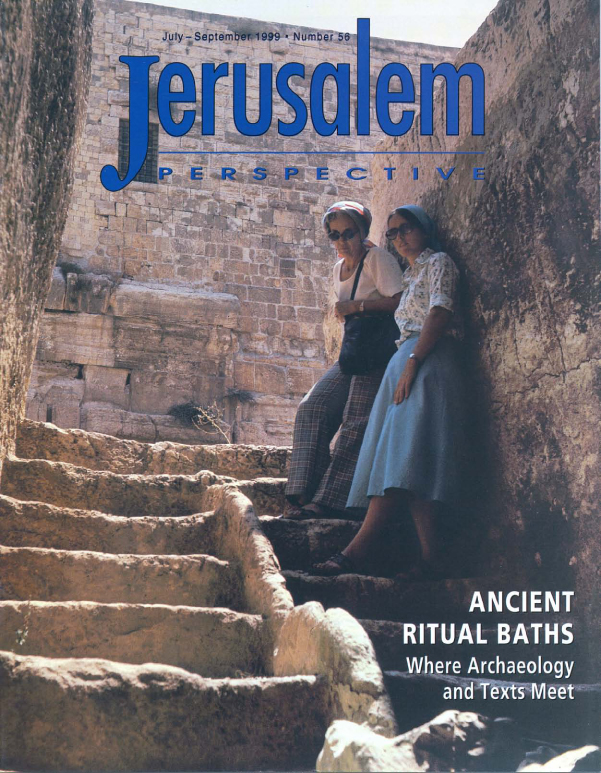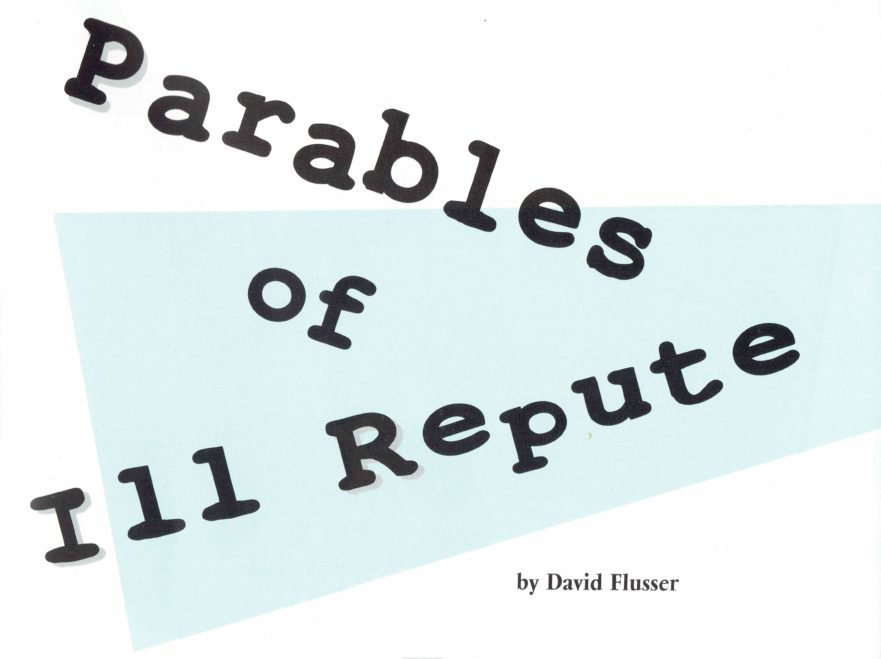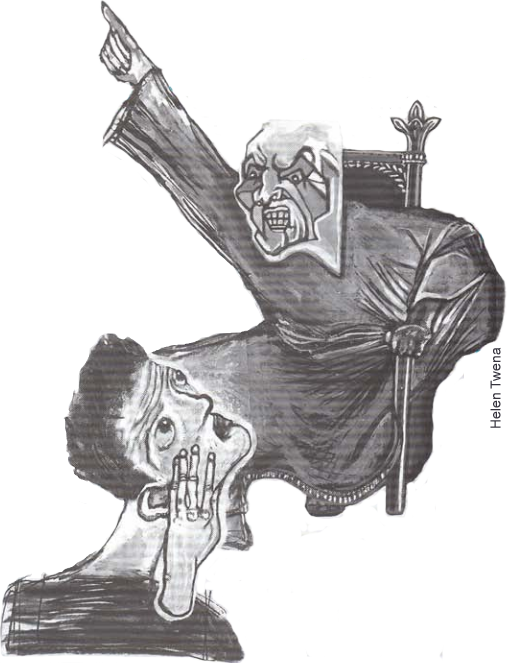How to cite this article: David Flusser, “Parables of Ill Repute,” Jerusalem Perspective 56 (1999): 25-27 [https://www.jerusalemperspective.com/1850/].

Once Shmuel ha-Katan, a sage who flourished at the end of the first century C.E, decreed a day of fasting and prayer for rain. The people began their fast at sunset, and rain fell before sunrise. They interpreted the rain as a sign of divine favor. Then Shmuel told them a parable:
What does this situation resemble? It is like a slave who requests his ration from his master. The master says to them, “Give it to him so that I may not hear his voice!” (Babylonian Talmud, Ta‘anit 25b)
On another occasion Shmuel decreed a time of fasting and prayer for rain. The people began their fast at sunset, but rain did not fall until late into the next evening. Again they interpreted the rain as a sign of divine favor. Then Shmuel told them a parable:
What does this situation resemble? It is like a slave who requests his ration from his master. The master says to them, “Wait until he languishes and suffers! Afterwards, give it to him!” (Babylonian Talmud, Ta‘anit 25b)
| Rather listen instead? |
| JP members can click the link below for an audio version of this essay.[*]
Paid Content
Premium Members and Friends of JP must be signed in to view this content. If you are not a Premium Member or Friend, please consider registering. Prices start at $5/month if paid annually, with other options for monthly and quarterly and more: Sign Up For Premium  |
In both of these parables, Shmuel cast God in an unsettling role. In the first, he depicted God as the irascible master who shuns the voice of his slave. The slave represents the people. In the second, again he depicted God as the master. This time, however, ignoring the request, the callous master makes his hungry slave suffer.
The point of these two parables is clear: the people have no reason to boast. The shock and humor of the parables, which obviously captured the attention of Shmuel’s audience, emerge from the scandalous conduct attributed to God. Far from being noble, his conduct falls far short of expectations, both ancient and modern.
Shmuel’s purposeful distortion of God’s character served to heighten the dramatic effect of the parables. He did not intend that the master’s conduct should be emulated: it is despicable. The gap between our expectations and the master’s conduct can be bridged only with laughter.
The Synoptic Evangelists recorded approximately thirty different parables told by Jesus. Three synoptic parables remind us of Shmuel’s scandalous parables, because the protagonists behave in a morally ambiguous manner. Interestingly, only Luke included these scandalous parables in his Gospel.
The first two scandalous parables deal with prayer: The Friend at Midnight (Luke 11:5-8) and The Impious Judge (Luke 18:2-8). In the first parable, a man wakes a sleeping friend at midnight and asks for three loaves of bread. At first the sleepy friend tells his late-night visitor to go away. Motivated not by concern for his friend, but self-interest, the friend eventually acquiesces and gives the loaves to the man. Likewise, in the second parable, a judge who neither fears God nor has regard for humanity, finds himself cornered by a persistent widow demanding legal protection. Her repeated visits finally convince the judge that giving a ruling on her behalf will be the easiest way out of his predicament.
Each of these parables sets up a mini-drama that parallels, but is antithetical to, reality. Of course, people petition God at all hours of the day with urgent requests, and widows look to him for justice. But unlike the sleepy friend who complies with the request out of embarrassment that the neighbors might hear, or simply out of frustration, God responds because of his genuine concern for humanity. And unlike the impious judge who grants justice because of the widow’s unflagging appeals, God stands ready to protect those whom society has overlooked.
Jesus was not suggesting that the behavior of the sleepy friend or impious judge be emulated. On the contrary, their disappointing conduct represents a glaring contrast to God’s. From the contrast, the parables’ humor emerges.
The Dishonest Steward (Luke 16:1-9) is Jesus’ most scandalous parable. Originally told as a critique of the Essenes’ attitude toward non-sectarians and their wealth, this parable portrays God as the master of a sly steward (a non-sectarian) who has mismanaged his money. Accordingly, the master notifies the steward that he will be dismissed. Faced with the horror of manual labor or begging for a livelihood, the steward summons each of the master’s debtors and cancels the debt in the hope of creating for himself a safety net after his dismissal. To the audience’s surprise, the master, who suffered financial loss because of the steward, praises him.
Here again, the aim of the parable is not to promote dishonest handling of money. Rather, using a very funny parable, Jesus criticized the Essenes centripetal mentality, which had found expression in their economic policy. The Essenes avoided commercial transactions with outsiders. The master’s praise for the dishonest servant should not be interpreted as an endorsement of such improper behavior, but as a critique of the Essenes’ narrow attitude toward non-sectarians and their money.[1]
The scandalous elements of these three Lukan parables serve as another indication of the continuity in motifs and literary forms between the Synoptic tradition and rabbinic literature. As I have said elsewhere, the rabbinic writings constitute “our principal source” for interpreting Matthew, Mark and Luke.[2] For me at least, this conclusion means that Jesus stood closer to Pharisaic Judaism than to the other major first-century Jewish sects.
Lastly, Luke’s inclusion of scandalous parables in his Gospel tells us something about his handling of his two written sources: Luke apparently sought to represent all facets of their contents. He was willing to include Jesus’ scandalous parables, even if their inclusion meant that God might be perceived as behaving improperly and the point of the parables be misunderstood. Matthew and Mark may not have been willing to risk such consequences.[3]
As a Gospel writer, Luke was both independent of Matthew and Mark, and bold. Regarding his independence, he was the only Evangelist not to implicate the Pharisees in the events leading up to Jesus’ death. Regarding his boldness, Luke alone mentioned the atrocities of Roman officials (cf. Luke 13:1). The results of our present, brief study further attest to Luke’s independence from Matthew and Mark, and his boldness—independence, by preserving the three scandalous parables, and boldness, by transmitting parables that portrayed God in a morally ambiguous light.
Premium Members and Friends of JP must be signed in to view this content.
If you are not a Premium Member or Friend, please consider registering. Prices start at $5/month if paid annually, with other options for monthly and quarterly and more: Sign Up For Premium

- [1] For a full discussion of the Dishonest Steward parable’s meaning, see David Flusser, “Jesus and the Essenes.” ↩
- [2] See David Flusser, “The Dead Sea Sect and Pre-Pauline Christianity,” in Judaism and the Origins of Christianity (Jerusalem: Magnes, 1988), 24. ↩
- [3] The closest Matthew came to including a scandalous parable in his Gospel was his inclusion of The Day Laborers in the Vineyard (Matt. 20:1-16). The scandalous and critical moment of this parable is God’s declaration, “Am I not allowed to do what I wish with what is mine?” The evidence from the Synoptic Gospels suggests that Matthew and, particularly, Mark were more sensitive than Luke to including scandalous elements in their compositions. ↩



![David Flusser [1917-2000]](https://www.jerusalemperspective.com/wp-content/uploads/userphoto/21.jpg)
